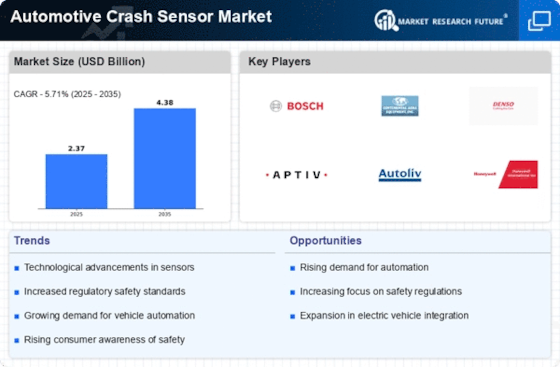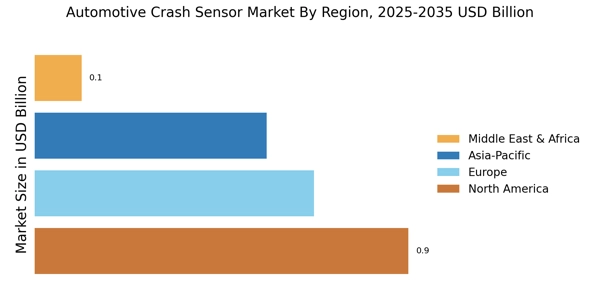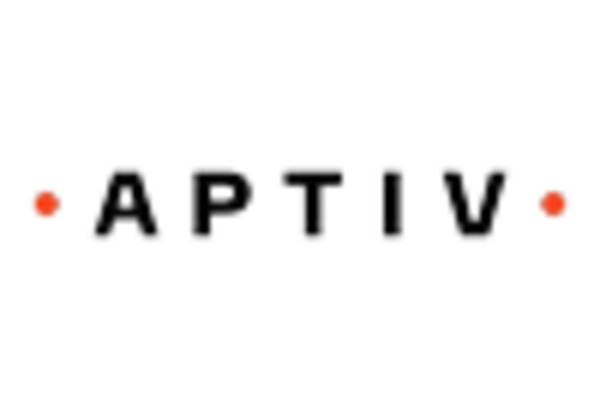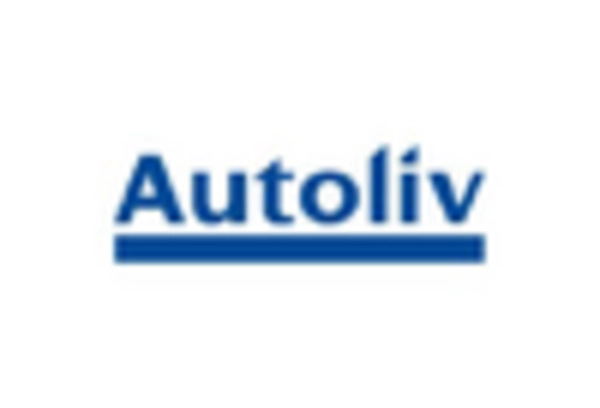Increasing Vehicle Safety Regulations
The Automotive Crash Sensor Market is experiencing a surge in demand due to the implementation of stringent vehicle safety regulations across various regions. Governments are mandating advanced safety features in vehicles, which include crash sensors as a critical component. For instance, regulations such as the Euro NCAP and NHTSA standards require vehicles to be equipped with advanced safety systems that utilize crash sensors to detect collisions and deploy airbags effectively. This regulatory push is likely to drive the market, as manufacturers strive to comply with these standards, thereby enhancing the overall safety of vehicles. The increasing focus on reducing road fatalities and injuries further propels the demand for automotive crash sensors, making them indispensable in modern vehicle design.
Growth of Electric and Autonomous Vehicles
The Automotive Crash Sensor Market is poised for growth due to the rising popularity of electric and autonomous vehicles. These vehicles often incorporate advanced safety features, including sophisticated crash sensors, to ensure passenger safety. As the automotive industry shifts towards electrification and automation, the demand for reliable crash detection systems is expected to increase. Autonomous vehicles, in particular, rely heavily on crash sensors to navigate safely and avoid collisions. The integration of these sensors into electric and autonomous vehicles is likely to create new opportunities for market players. As manufacturers invest in developing safer and more efficient vehicles, the automotive crash sensor market is anticipated to expand significantly.
Rising Consumer Awareness of Vehicle Safety
Consumer awareness regarding vehicle safety is a pivotal driver for the Automotive Crash Sensor Market. As individuals become more informed about the risks associated with road travel, there is a growing demand for vehicles equipped with advanced safety features, including crash sensors. Surveys indicate that a significant percentage of consumers prioritize safety features when purchasing vehicles, which in turn influences manufacturers to integrate more sophisticated crash sensor systems. This trend is likely to continue, as consumers increasingly seek vehicles that offer enhanced protection. The heightened focus on safety not only drives demand but also encourages manufacturers to innovate and improve their crash sensor technologies, thereby fostering market growth.
Technological Advancements in Sensor Technology
The Automotive Crash Sensor Market is significantly influenced by rapid technological advancements in sensor technology. Innovations such as improved accelerometers, gyroscopes, and pressure sensors are enhancing the accuracy and reliability of crash detection systems. These advancements enable vehicles to respond more effectively during collisions, thereby improving passenger safety. The integration of artificial intelligence and machine learning algorithms into crash sensors is also emerging, allowing for predictive analytics that can assess potential crash scenarios. As manufacturers adopt these cutting-edge technologies, the market is expected to witness substantial growth. The increasing complexity of automotive systems necessitates the incorporation of sophisticated crash sensors, which could lead to a more robust market landscape.
Increasing Investment in Research and Development
Investment in research and development is a crucial driver for the Automotive Crash Sensor Market. As competition intensifies among automotive manufacturers, there is a strong emphasis on developing innovative crash sensor technologies. Companies are allocating substantial resources to R&D to enhance the performance and functionality of crash sensors. This investment is aimed at creating sensors that can operate effectively in diverse conditions and provide real-time data during collisions. Furthermore, collaborations between automotive manufacturers and technology firms are becoming more common, leading to the development of next-generation crash sensors. This focus on innovation is likely to propel the market forward, as enhanced crash sensor technologies become essential for meeting consumer expectations and regulatory requirements.

















